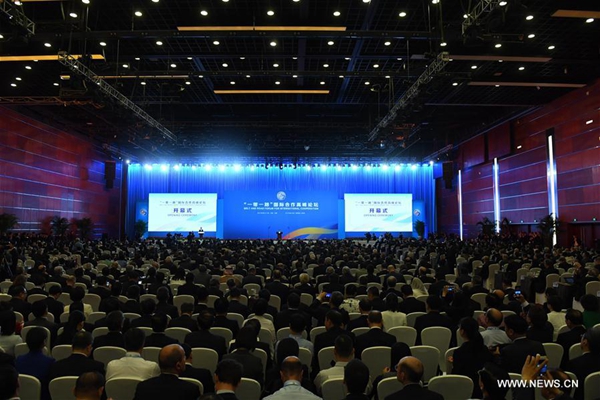Beijing 'Belt and Road' Forum -- putting flesh on the bones
- By Tim Collard
 0 Comment(s)
0 Comment(s) Print
Print E-mail China.org.cn, May 14, 2017
E-mail China.org.cn, May 14, 2017
|
|
| The Belt and Road Forum (BRF) for International Cooperation opens in Beijing, capital of China, May 14, 2017. (Xinhua/Zhang Duo) |
That China's standing in the world has vastly improved over the last few decades is undeniable. Such levels of economic development cannot help but have influence beyond the country's own borders.
Once Xi Jinping took over China's leadership in 2012, he and his team inaugurated a comprehensive scheme to manage the impact of China's new-found economic power on the outside world, with the aim of ensuring that both China and her neighbors would derive tangible and lasting benefits from the East Asian powerhouse.
The Belt and Road Initiative (BRI) was accordingly launched in 2013, with its own funding mechanism, the Asian Infrastructure Investment Bank (AIIB) following shortly afterwards, with support from countries in East and West. China has already earmarked US$40 billion for a dedicated BRI fund, on top of the already committed US$100 billion capitalization for the AIIB.
A number of projects, largely involving China's near neighbors, have already been initiated. China claims that project contracts worth US$304.9 billion in Belt and Road partner countries were signed between 2014 and 2016; an estimated US$900 billion of investment is planned in trading infrastructure, ranging from ports to high-speed railways to gas pipelines, an investment program on an unprecedented scale.
Though it obviously makes sense to address particular needs wherever they emerge, the Chinese leadership is keen to give a strategic dimension to the whole process, to ensure that the project does not dissipate in uncoordinated individual projects. To that end China has invited heads of state and government of those countries wishing to deepen their involvement in the program to an international forum in Beijing on May 14-15. Twenty-nine national leaders will attend the forum.
One of China's main aims in holding this forum is to convince partners and potential partners that this Chinese-led project offers genuine win-win solutions. A recent Xinhua commentary quoted Confucius as saying: "He who wants success should enable others to succeed."
In particular, it is important to ensure that the European end of the Belt and Road Initiative is fully on board. Most major European countries have signed up to the AIIB, indicating willingness in principle to participate; but Western Europeans on the whole have been slow to commit themselves to concrete participation.
Partly this is due to the uncertainty over the future of the "European Union" following the U.K.'s decision to leave. The U.K. was the first European country to sign up to the AIIB. China has already set up a cooperation forum with 16 Central and Eastern European countries, some of which are EU members and some not.
The financial giant Switzerland has set an example of third-party cooperation by functioning as an observer in this forum. It is becoming clear that China's economic relations with Europe are not dependent on the complex legal framework of the "European Union," but may work better by dealing with individual countries and smaller, more flexible groupings. Such an approach may help to redress the current imbalance in investment flows: in 2016 China invested four times more in Europe than EU companies invested in China.
Another potential problem is that, by its very nature, the wide-ranging Belt and Road (B&R) program passes through regions with security problems. Though national governments are committed to the projects, there are dangers of popular turmoil. Some B&R projects in Sri Lanka have attracted public protests, and Pakistan, where over US$50 billion has been invested in the China-Pakistan Economic Corridor, has set up a new division of the armed forces to protect the corridor.
There are also sovereignty disputes between India and Pakistan in the region of the corridor. No doubt the Beijing Forum will provide an opportunity for China to emphasize the importance of addressing these concerns, which will be another win-win, in the sense of improving both economic conditions and internal security in the countries affected.
It has long been a central feature of China's foreign policy that peace and security are best underpinned by solid and mutually beneficial economic and commercial partnerships. For that reason many high-level representatives of troubled countries and regions will be attending the forum, including leading figures from war-torn Syria and the DPRK. If the ramifications of the Belt and Road Initiative lead to a slackening of tensions in these areas, the world will have a great deal to thank China for.
Thus there are many things at stake in Beijing this weekend. China has the opportunity to engage her partners in the Belt and Road Initiative through a sustainable strategy, with advantages both to the partners and to China's internal development, as much of the Chinese involvement is centred in parts of the country which have hitherto been left behind by the massive growth of China's eastern coastal strip.
The weekend's events will serve to engage the rest of the world in shaping China's vision for the economic future.
Tim Collard is a columnist with China.org.cn. For more information please visit:
http://www.china.org.cn/opinion/timcollard.htm
Opinion articles reflect the views of their authors, not necessarily those of China.org.cn.







Go to Forum >>0 Comment(s)